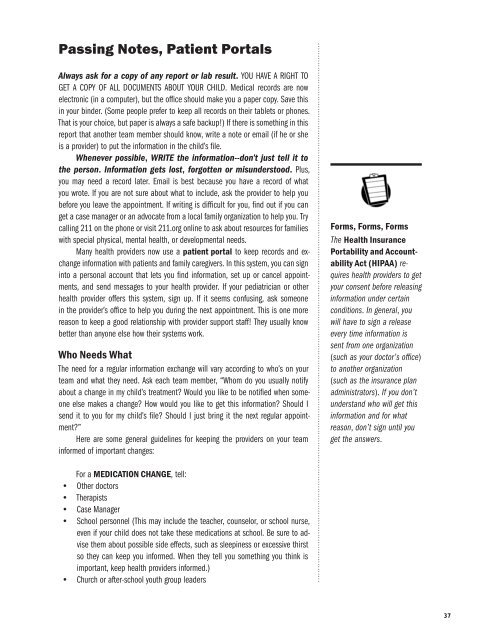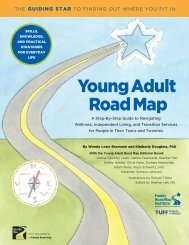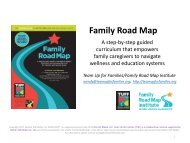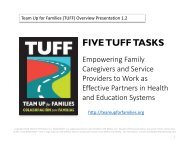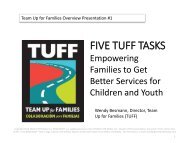Family Road Map Guide
You also want an ePaper? Increase the reach of your titles
YUMPU automatically turns print PDFs into web optimized ePapers that Google loves.
Passing Notes, Patient Portals<br />
Always ask for a copy of any report or lab result. YOU HAVE A RIGHT TO<br />
GET A COPY OF ALL DOCUMENTS ABOUT YOUR CHILD. Medical records are now<br />
electronic (in a computer), but the office should make you a paper copy. Save this<br />
in your binder. (Some people prefer to keep all records on their tablets or phones.<br />
That is your choice, but paper is always a safe backup!) If there is something in this<br />
report that another team member should know, write a note or email (if he or she<br />
is a provider) to put the information in the child’s file.<br />
Whenever possible, WRITE the information--don’t just tell it to<br />
the person. Information gets lost, forgotten or misunderstood. Plus,<br />
you may need a record later. Email is best because you have a record of what<br />
you wrote. If you are not sure about what to include, ask the provider to help you<br />
before you leave the appointment. If writing is difficult for you, find out if you can<br />
get a case manager or an advocate from a local family organization to help you. Try<br />
calling 211 on the phone or visit 211.org online to ask about resources for families<br />
with special physical, mental health, or developmental needs.<br />
Many health providers now use a patient portal to keep records and exchange<br />
information with patients and family caregivers. In this system, you can sign<br />
into a personal account that lets you find information, set up or cancel appointments,<br />
and send messages to your health provider. If your pediatrician or other<br />
health provider offers this system, sign up. If it seems confusing, ask someone<br />
in the provider’s office to help you during the next appointment. This is one more<br />
reason to keep a good relationship with provider support staff! They usually know<br />
better than anyone else how their systems work.<br />
Who Needs What<br />
The need for a regular information exchange will vary according to who’s on your<br />
team and what they need. Ask each team member, “Whom do you usually notify<br />
about a change in my child’s treatment? Would you like to be notified when someone<br />
else makes a change? How would you like to get this information? Should I<br />
send it to you for my child’s file? Should I just bring it the next regular appointment?”<br />
Here are some general guidelines for keeping the providers on your team<br />
informed of important changes:<br />
Forms, Forms, Forms<br />
The Health Insurance<br />
Portability and Accountability<br />
Act (HIPAA) requires<br />
health providers to get<br />
your consent before releasing<br />
information under certain<br />
conditions. In general, you<br />
will have to sign a release<br />
every time information is<br />
sent from one organization<br />
(such as your doctor’s office)<br />
to another organization<br />
(such as the insurance plan<br />
administrators). If you don’t<br />
understand who will get this<br />
information and for what<br />
reason, don’t sign until you<br />
get the answers.<br />
For a MEDICATION CHANGE, tell:<br />
• Other doctors<br />
• Therapists<br />
• Case Manager<br />
• School personnel (This may include the teacher, counselor, or school nurse,<br />
even if your child does not take these medications at school. Be sure to advise<br />
them about possible side effects, such as sleepiness or excessive thirst<br />
so they can keep you informed. When they tell you something you think is<br />
important, keep health providers informed.)<br />
• Church or after-school youth group leaders<br />
37


